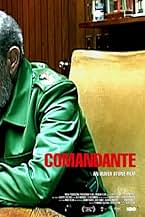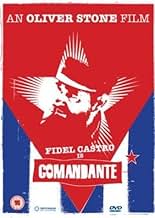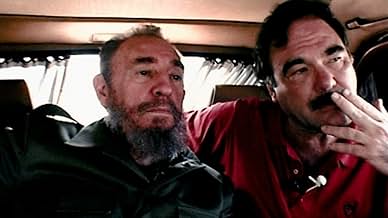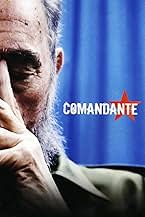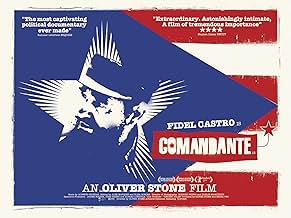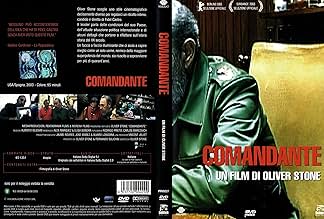PUNTUACIÓN EN IMDb
6,9/10
3,9 mil
TU PUNTUACIÓN
Añade un argumento en tu idiomaDocumentary on the director's meeting with Castro.Documentary on the director's meeting with Castro.Documentary on the director's meeting with Castro.
Ernesto 'Che' Guevara
- Self
- (metraje de archivo)
John F. Kennedy
- Self
- (metraje de archivo)
Richard Nixon
- Self
- (metraje de archivo)
Janet Reno
- Self
- (metraje de archivo)
Jaume Roures
- Self
- (sin acreditar)
Santiago Segura
- Self
- (sin acreditar)
Reseñas destacadas
I just saw Comandante on Greek public television, in its entirety and uninterrupted and was immediately drawn to it.
Whether one agrees with Cuba's political system or not, is not the issue here. What Oliver Stone has achieved is what no journalist or historian has ever come close to. He brings himself and his crew right up close to the aged leader and confronts him relentlessly with questions from the mundane to the esoteric and from the political to the personal. Ideas about the past and the future, about dreams, art, democracy, colonialism, family, religion, women's rights, education, love etc are all exposed here, bringing out an intimate portrait. The questions are often uncomfortable as when Stone asks Castro about his ex wives in front of his wife, or when his claims about policing in Cuba are denied by one of Stone's crew members. Yet Castro even at this age, is sharp, humorous and poetic in a way that reveals the intellectual behind the politician.
It is also a travel documentary of Havana where Fidel Castro is Stone's guide and walks him through the city's monuments and cafés, sits next to him at the back seat of his car, eats and drinks with him and we get a sense that he knows what is happening in Havana's every alley.
One thing is for sure: no other country leader would ever allow himself the closeness Castro offers to Stone and expose his feelings and doubts with such spontaneity.
Stone turns a formal encounter into a family visit and brings the audience to meet an iconic political figure and spend a couple of intimate hours with him.
A work that leaves you thinking for a long while.
Whether one agrees with Cuba's political system or not, is not the issue here. What Oliver Stone has achieved is what no journalist or historian has ever come close to. He brings himself and his crew right up close to the aged leader and confronts him relentlessly with questions from the mundane to the esoteric and from the political to the personal. Ideas about the past and the future, about dreams, art, democracy, colonialism, family, religion, women's rights, education, love etc are all exposed here, bringing out an intimate portrait. The questions are often uncomfortable as when Stone asks Castro about his ex wives in front of his wife, or when his claims about policing in Cuba are denied by one of Stone's crew members. Yet Castro even at this age, is sharp, humorous and poetic in a way that reveals the intellectual behind the politician.
It is also a travel documentary of Havana where Fidel Castro is Stone's guide and walks him through the city's monuments and cafés, sits next to him at the back seat of his car, eats and drinks with him and we get a sense that he knows what is happening in Havana's every alley.
One thing is for sure: no other country leader would ever allow himself the closeness Castro offers to Stone and expose his feelings and doubts with such spontaneity.
Stone turns a formal encounter into a family visit and brings the audience to meet an iconic political figure and spend a couple of intimate hours with him.
A work that leaves you thinking for a long while.
In the American corporate media, Castro is always played up as some kind of monster. The corporate media (and a host of draconian laws help) prevent us from hearing what he has to say. This documentary is excellent if anything but to give us a chance to hear what Castro has to say.
This was geared for an American audience, most of whom are probably ignorant about who Arbenz was, or Allende, and who probably never heard of the MPLA. It's mentioned at some point in the film that all the bad things that American big business and the CIA do around the world is known around the world - known everywhere except by US citizens. This is true, then again, the US is one of the few industrialized countries who for most of the 20th into the 21st century had almost all of it's radio and television channels, as well as newspaper printing presses controlled by corporations. It's unfortunate that Stone thus feels he has to ask about Cubans in Vietnam and this sort of nonsense which takes up time that could have been used asking more about Castro's perspective of what is going on in Latin America.
This was geared for an American audience, most of whom are probably ignorant about who Arbenz was, or Allende, and who probably never heard of the MPLA. It's mentioned at some point in the film that all the bad things that American big business and the CIA do around the world is known around the world - known everywhere except by US citizens. This is true, then again, the US is one of the few industrialized countries who for most of the 20th into the 21st century had almost all of it's radio and television channels, as well as newspaper printing presses controlled by corporations. It's unfortunate that Stone thus feels he has to ask about Cubans in Vietnam and this sort of nonsense which takes up time that could have been used asking more about Castro's perspective of what is going on in Latin America.
In communism/socialism the beginning is always the End. One dictator removes another from power by force. Many praise the men that at the moment believe what they fight for some kind of change, usually when the previous government has been corrupt in some way. Corruption creates poverty and poverty leads to stress then becomes the fuel for a revolution. Most revolutions in our history have lead to totalitarianism. I like to blame that on human nature the USA is not perfect but its pretty close if you do not know what it's like to live in Cuba don't be mistaken tourist don't see the suffering especially if you have the money. Venezuela is a fresh look on early Cuba lets see how its ends up in a few years. HUGO CHAVEZ and some fanatics are beginning to dismantle any checks and balances the country may have plans on changing how long he can serve as president no limit remind you of something. Enough about that after so many years and tears and lives lost at sea. The exiled Cubans have preserved peace by leaving through 90 miles of rough seas on anything that floats not recreating another revolt adding to the cycle of bull in almost 40 odd years. Thousands of lives lost at sea as well as injustices on that prisoner island. Please think why would so many people risk their lives in such a way.
This film is an interesting document only because it provides a glimpse into the leader's more trivial pursuits. ("I've seen TITANIC on video. It needs a big screen" says Castro.) It fails miserably where Oliver Stones asks tough questions yet fails to pursue the partial answers, or at times total avoidance of the question altogether.
Some of the issues talked around are surprising (The CIA role in Angola, Cuba's AIDS quarantine camps, the role of Miami exiles, 1980's prison camps for gays) while others are just bizarre (the lack of multiple parties in Cuban elections, his son's US education, Nicaragua and Venezuela).
The documentary instead puts us through yet another series of Che Guevara tales told less than honestly by Fidel. The frequent shots of Eva Peron suggest that Fidel Castro's revolution is not a failed relic but rather the dreamy illusions of yet another misguided albeit glamorous femme fatale.
Some of the issues talked around are surprising (The CIA role in Angola, Cuba's AIDS quarantine camps, the role of Miami exiles, 1980's prison camps for gays) while others are just bizarre (the lack of multiple parties in Cuban elections, his son's US education, Nicaragua and Venezuela).
The documentary instead puts us through yet another series of Che Guevara tales told less than honestly by Fidel. The frequent shots of Eva Peron suggest that Fidel Castro's revolution is not a failed relic but rather the dreamy illusions of yet another misguided albeit glamorous femme fatale.
10gavin-96
Watching recent documentaries from writers such as Michael Moore, one may be confused to what a documentary actually is. Comandante is a perfect example of what a documentary should be like. By the end of its running, the viewer has seen a balanced account with enough information either way to give food for thought.
I came away from this asking myself - 'is Castro a truly great man?', or is he 'full of ***t'?, or on the other hand has he just not practiced what he has preached?
Moore on the other hand comes from a journalistic angle, everything so over emphasised and dramatised, as if he is almost trying to convince the viewer to agree with him. He presents information through his own paradigm of the opinion he is carrying at the time.
Comandante is a mature documentary, flawless in presentation as Stones work generally is; but the key to its quality, is that it does not give you the answer. It documents the facts.
Comandante easily achieves what it sets out to do. Some viewers may expect more given the subject, but for the purist, satisfaction guaranteed.
I came away from this asking myself - 'is Castro a truly great man?', or is he 'full of ***t'?, or on the other hand has he just not practiced what he has preached?
Moore on the other hand comes from a journalistic angle, everything so over emphasised and dramatised, as if he is almost trying to convince the viewer to agree with him. He presents information through his own paradigm of the opinion he is carrying at the time.
Comandante is a mature documentary, flawless in presentation as Stones work generally is; but the key to its quality, is that it does not give you the answer. It documents the facts.
Comandante easily achieves what it sets out to do. Some viewers may expect more given the subject, but for the purist, satisfaction guaranteed.
¿Sabías que...?
- CuriosidadesAt the beginning of the movie, when Stone and Castro are strolling through the corridors, you see Santiago Segura, dressed in white, standing in front of a group of people.
- ConexionesFeatures Vatel (2000)
- Banda sonora11.11
Written and Performed by Paul Kelly
Selecciones populares
Inicia sesión para calificar y añadir a tu lista para recibir recomendaciones personalizadas
- How long is Comandante?Con tecnología de Alexa
Detalles
- Fecha de lanzamiento
- Países de origen
- Sitio oficial
- Idiomas
- Títulos en diferentes países
- Son efsane - Comandante
- Empresas productoras
- Ver más compañías en los créditos en IMDbPro
Taquilla
- Recaudación en todo el mundo
- 135.633 US$
- Duración1 hora 39 minutos
- Color
- Mezcla de sonido
Contribuir a esta página
Sugerir un cambio o añadir el contenido que falta

Principal laguna de datos
By what name was Comandante (2003) officially released in India in English?
Responde

